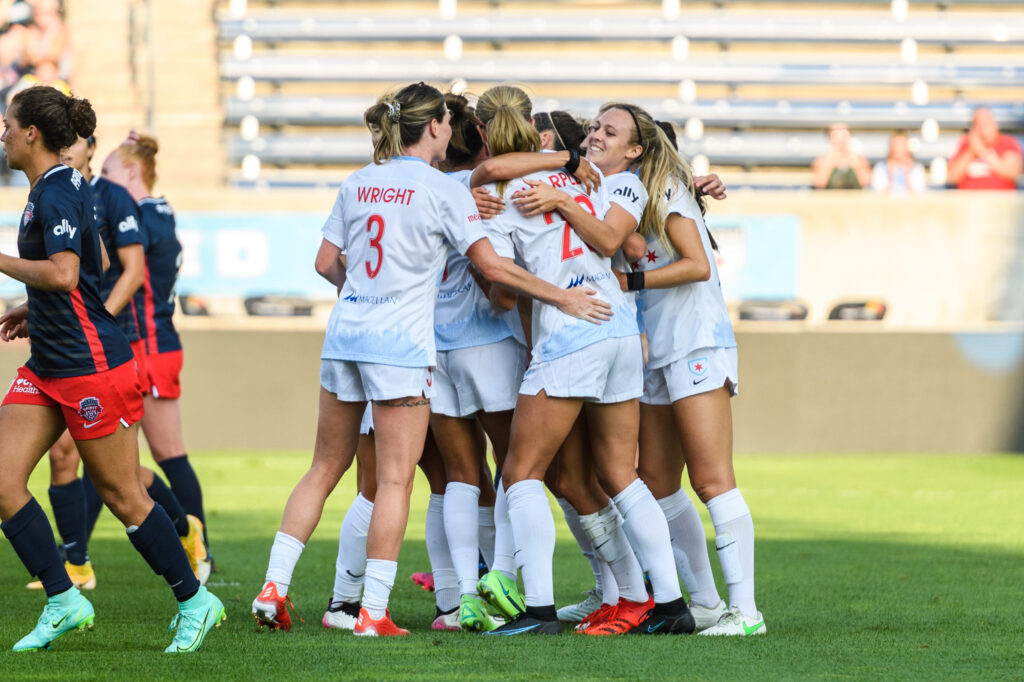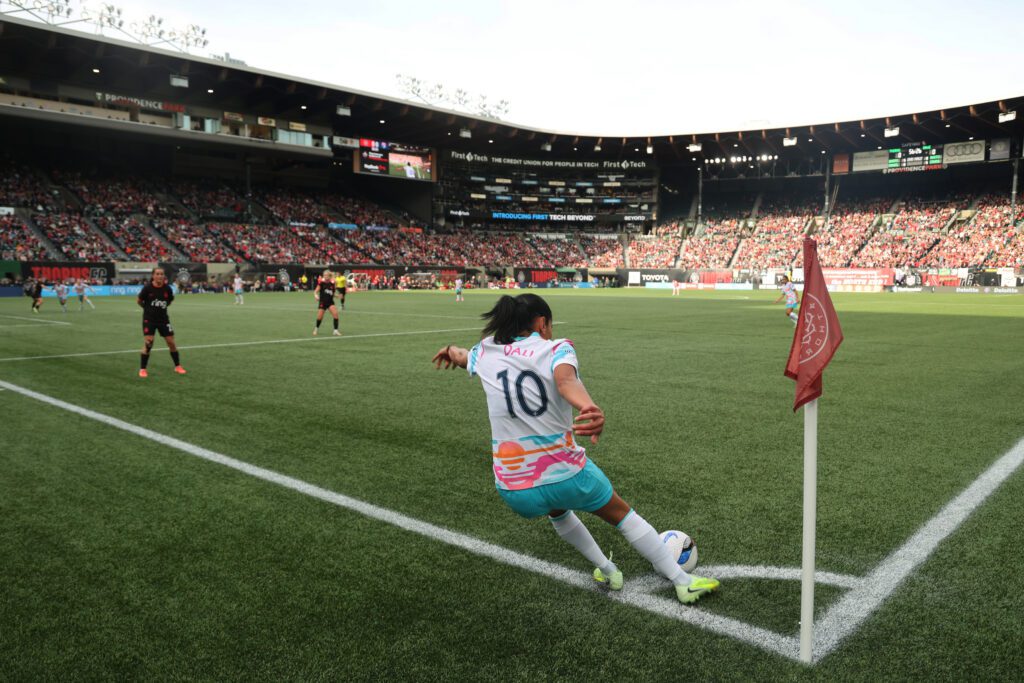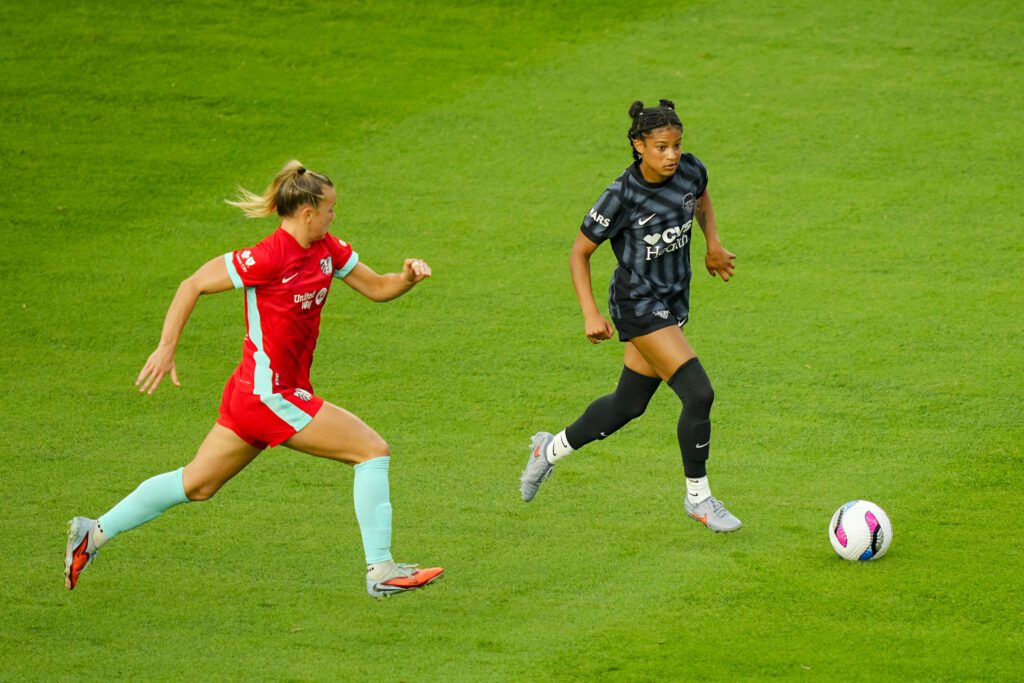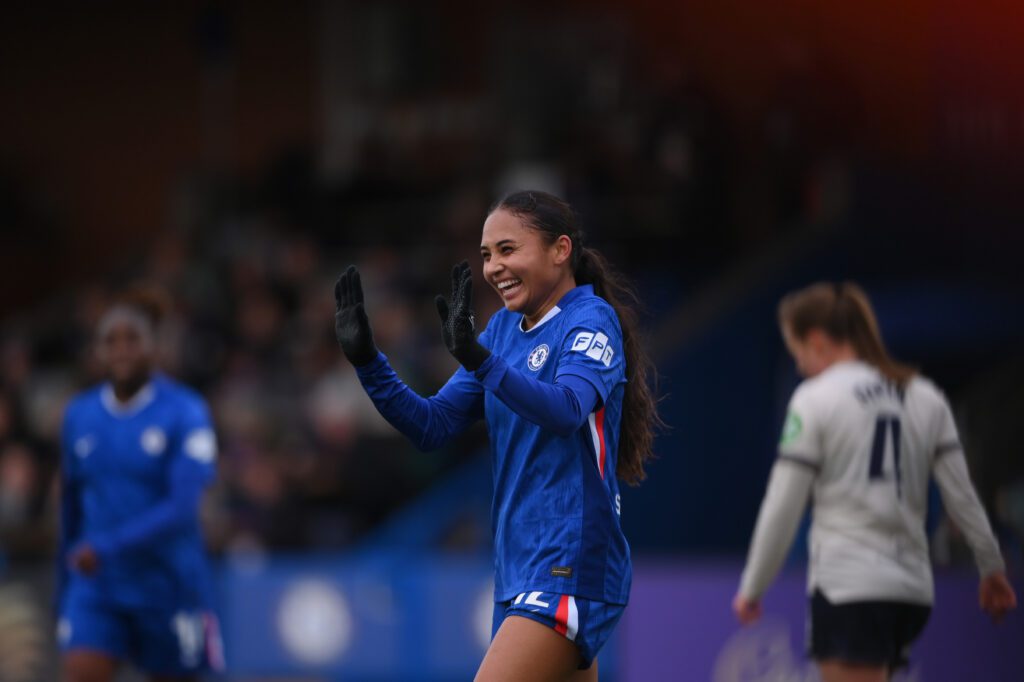The NWSL is in its ninth year and still operating without a collective bargaining agreement. The NWSL Players Association has been working to rectify that, searching for a solution with the league that both honors the sport’s past and presents a way forward.
In negotiating a historic first CBA, the PA is looking to secure advances like a raised minimum salary and a free agency that allows players to have more influence in their club options. The specifics of the negotiations remain behind closed doors by necessity, but the desire for clarity and equitable assurances remains obvious.
The NWSL is in the midst of a tumultuous season that has involved multiple firings and called player safety into question. The controversies have made the need for a CBA especially urgent. But as NWSLPA Executive Director Meghann Burke sees it, the basic issues at hand are not new. In fact, the foundation of these negotiations lies in the sport’s history, going all the way back to the Women’s United Soccer Association.
Before she practiced law, Burke played professionally in the WUSA. The league was already struggling during her rookie season, requiring swift action. As the 2003 preseason began, leaders from a number of teams arranged a conference call with every player in the league.
“Carla Overbeck, Mia Hamm, Julie Foudy, Joy Fawcett, Tiffeny Milbrett, Kristine Lilly, these giants who are my childhood heroes in the room are on the call,” Burke says. “And they say, ‘Look guys, everyone’s got to take a pay cut by 5 o’clock today or there’s no league tomorrow.’ And I feel like that was a moment for me to understand how fragile this was.”
The players did take a 25 percent pay cut before the 2003 WUSA season, but those league leaders made a promise to the young players that minimum salaries wouldn’t fall below a threshold of $25,000. Ultimately, the sacrifices from the players were not enough to save the league, which folded that same year.
Julianne Sitch, former Chicago Red Stars player and current assistant coach, doesn’t remember the player union specifically, but she does remember star players advocating for similar measures in the waning years of Women’s Professional Soccer, the league that directly predated the NWSL.
“It was just players trying to fight for us,” she says. “And it was the top-name players trying to fight for us.”
What WPS players wanted was more flexibility in their schedules to pick up side hustles that would supplement their incomes as they began to absorb pay cuts. What they got in return was an ultimatum: Accept what the league can provide, or there won’t be a league at all.
The players’ sacrifices weren’t enough to save WPS either, and the league folded in 2012. This left players like Sitch with little recourse other than to scramble to find opportunities overseas in order to keep playing at a professional level.
When the NWSL started in 2013, the message from owners and players was similar: In order for women’s professional soccer in America to thrive, the league had to learn from the failures of the ones before it. That philosophy has been an essential part of the NWSL’s steady growth and stability.
But once again, players have needed to make sacrifices in order to keep the enterprise afloat.
The NWSLPA was formed in 2017, the league’s fourth season, and formally recognized in 2018 as a bargaining representative for all players non-allocated by an international federation. In the years since then, the organization has developed its own resources, worked with sponsors to create advancement opportunities for players and, perhaps most significantly to date, negotiated a safe return to play for the 2020 Challenge Cup.
In 2021, the NWSLPA is still trying to claw its way back to the protected $25,000 threshold that WUSA players fought for in 2003. The current minimum NWSL salary is $22,000.
“By the time WPS had folded, when I came back into the NWSL was really when I needed to have multiple jobs,” Sitch says. “As a pro athlete, I’m supposed to be at my top form. However, I’m waking up to train clients at 6 a.m. And then being on my feet doing that, and then going to training, and then turning around and going and coaching, and being on my feet longer and coming home by 8 o’clock at night, resting, and trying to do that all over again five days a week — it took a toll on you.
“You want these athletes to be in their top form. However, I’m doing way more, and it was exhausting at times.”
Sitch retired from her playing career in 2015. The PA’s No More Side Hustles campaign, which launched this season, shows that not much has changed for players in the years since then.
Professional athletes, regardless of gender, shouldn't have to work 2, 3, and 4 jobs to support themselves.
— NWSLPA (@nwsl_players) July 22, 2021
The NWSLPA is proud to announce the launch of https://t.co/l6VTKJg7r2! Join us in taking action in the fight for #EqualPay, #FairPay & #NoMoreSideHustles pic.twitter.com/UWjVelV7JJ
According to the campaign’s website, roughly one third of all NWSLPA members make the league’s minimum salary and approximately 75 percent make $31,000 or less. Many current players have stories of coaching gigs, barista jobs or other means of extra income that allow them to live on an NWSL salary.
These first-person accounts highlight the need for a fair CBA. To Burke, they also present an opportunity for fans to get to know players better.
“Putting aside the dollars and cents and the figures, what’s most compelling to me are these player stories, what their lived experiences are because everyone has a story to tell,” she says. “And to a person, these are compelling people with unique experiences and insights, and each of them understand. They have so much skin in the game, so much skin in the future of NWSL. They get it. They’re not asking for the moon.”
If No More Side Hustles highlights the need for higher wages so that players can focus on their craft, the collective bargaining agreement will give players more control over their own careers.
Chicago Red Stars midfielder Danielle Colaprico has played for one club during her six years in the league. She understands that trades are part of the game, but she’s also seen how they can strain players’ lives outside of soccer.
“As players, we understand that trades can happen whenever, and unfortunately for me, I feel like some of my closest friends have left the team, which is bad,” she says. “But I think at the same time for us as professionals and players, it’s important to take the emotion out of it and realize that the coach and the club are trying to make the best decisions for the club itself.”
This year, the collective decision-making of those in power has come into question, and the NWSL has come to a reckoning of sorts.
Clubs have flushed out a number of people in leadership positions who violated the league’s new anti-harassment policy. Gotham FC fired general manager Alyse Lahue on account of the policy. The Washington Spirit and Racing Louisville also dismissed their head coaches after reports surfaced detailing allegations of verbal abuse and toxic training environments.

While every circumstance is different, Burke believes that a fair CBA can empower players to speak out when they are witnessing or experiencing an abuse of power — a right that players are not afforded under the league’s current contract structure.
“It is a very draconian system. It’s the most extreme form of league control that I have seen or that I’m aware of in professional sports,” Burke says.
“Right now, in the current system of rules, a player can be fired on 24 hours notice. Some significant percentage of players are on what’s called semi-guaranteed contracts, which means they can be fired, full stop. … A player, even after her contract has expired, still cannot go negotiate to find a better deal. So it shouldn’t be surprising to anyone then that when a player sees the powerbroker in that system, the coach, is abusing his authority, if you speak out, what do you think can happen to you? It’s not that hard to figure out, and so it deters players of conscience from speaking out.”
If there is a way forward in an abuse-free league, clubs have to create environments that empower players to speak up.
“When you look at the culture that’s been created in a number of teams, if we had one situation like this, I might say, ‘Yeah, that’s a one-off problem.’ If you’ve got two, you start to kind of wonder. When you’ve got three or more, I really wonder what systemically is going on there,” Burke says. “Having grown up in the game myself, I’ve played for verbally abusive coaches. I wonder to what extent we’ve been conditioned to think this is OK.”
Sitch sees the shift as generational, with today’s players understanding the history of sacrifices while also pushing the sport to improve.
“A lot of the players my age in that generation, we were so grateful to be playing that we almost kept our mouths shut a little bit,” she says. “And I think it’s starting to open up now where there’s a balance. We should be grateful we have a league. However, we do need to be better.”
One solution, Burke says, is to get more former players coaching in the NWSL. Sitch also thinks that improving the pipeline will not only lead to a more diverse and qualified candidate pool but also prepare more players for post-playing careers — especially when they haven’t been compensated enough to have saved very much money.
One other solution is even more fundamental to a CBA negotiation: wages. In her most recent address to the media, NWSL commissioner Lisa Baird said players average $52,502 a year in full compensation, including year-round housing and health insurance. The benefits have helped ease transitions and costs, but players can’t take those in-kind assets with them, and they can be revoked by teams at any time.
Burke believes that fundamental needs like pay raises and contract assurances can provide personal security for players, and everything else will follow.
“Maybe it’s a function of where we are right now, but our players largely want the same thing,” she says. “They want to see greater control over their lives and their careers.”
Like many other NWSL players, Colaprico has a side job coaching in the Chicago area and lives with teammates in club housing. But the value of stability is still somewhat intangible to the 28-year old.
“It is hard on the players when someone has to uproot their lives and go to another team the next day, and they don’t even get a say of if they want to go or not,” Colaprico says. “And it’s sad, because I feel like sometimes you see people retire because of that. I feel like there have been several players in our league that have just stopped playing because they’re like, ‘Well, I don’t want to go play for that club, and that’s so far away from home, and I have a life here.’ And I feel like it’s most important for me as a person to be in a place that feels like home.”

With a personal investment in seeing the league succeed, the Players Association is motivated to stay positive, but negotiations haven’t moved as quickly as Burke hoped (“I would have liked to see more progress up to this point,” she said in August). All involved are motivated by the belief that greater stability in the workforce will lead to a better product and happier fans.
“I really think this can be the place where the world’s best players want to play, and the world that soccer fans want to watch,” Burke says. “And I really truly believe that in my heart, or I wouldn’t be sitting in this role, pushing the league as hard as I am to change the paradigm that we’re operating in.”
Sitch also believes that the league office can help explain decisions that seem to overlook player concerns by being more transparent. Most recently, players took to social media to criticize the logistics of the NWSL championship game, which the NWSL scheduled to be played in Portland at 9 a.m. local time in an agreement with television partner CBS.
“I think when we can actually understand why the decision is being made, it’s easier for players to be like, ‘All right, cool … now we just have to do what we have to do and we’ll roll with it,’” Sitch says.
Colaprico hopes teams can also fill in the gaps in player welfare, such as promoting mental health services for players.
“I feel like a lot of players struggle with that because, as an athlete, you think you’re fine. You want to push through everything because you don’t want to be classified as weak,” she says. “But at the same time, mental health is huge. And it’s something to be on top of because it can get you in the worst way and you may not even realize what it’s doing to you.”
For both Sitch and Burke, what the negotiations come down to is players feeling valued and secure. Because when that happens, everybody wins.
“If I feel valued in my work and I feel like I’m taken care of and I feel like I’m invested in, nine times out of ten you’re going to put a lot more into that program or that company,” Sitch says. “And in return you are both benefiting each other and helping move forward.”
“There’s intrinsic motivation and loyalty,” Burke concurs. “What we’re seeking in our CBA is longevity of a career and stability. That doesn’t imply that you’re going to go play for six teams in one season or in six years — in fact, quite the opposite. It implies that players want to make a commitment to their club. That means something. That’s a two-way street.”




